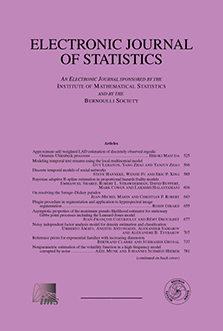Abstract
In this paper, we consider the problem of estimating nonparametrically a mean pattern intensity $\lambda$ from the observation of $n$ independent and non-homogeneous Poisson processes $N^{1},\dots,N^{n}$ on the interval $[0,1]$. This problem arises when data (counts) are collected independently from $n$ individuals according to similar Poisson processes. We show that estimating this intensity is a deconvolution problem for which the density of the random shifts plays the role of the convolution operator. In an asymptotic setting where the number $n$ of observed trajectories tends to infinity, we derive upper and lower bounds for the minimax quadratic risk over Besov balls. Non-linear thresholding in a Meyer wavelet basis is used to derive an adaptive estimator of the intensity. The proposed estimator is shown to achieve a near-minimax rate of convergence. This rate depends both on the smoothness of the intensity function and the density of the random shifts, which makes a connection between the classical deconvolution problem in nonparametric statistics and the estimation of a mean intensity from the observations of independent Poisson processes.
Citation
Jérémie Bigot. Sébastien Gadat. Thierry Klein. Clément Marteau. "Intensity estimation of non-homogeneous Poisson processes from shifted trajectories." Electron. J. Statist. 7 881 - 931, 2013. https://doi.org/10.1214/13-EJS794
Information





